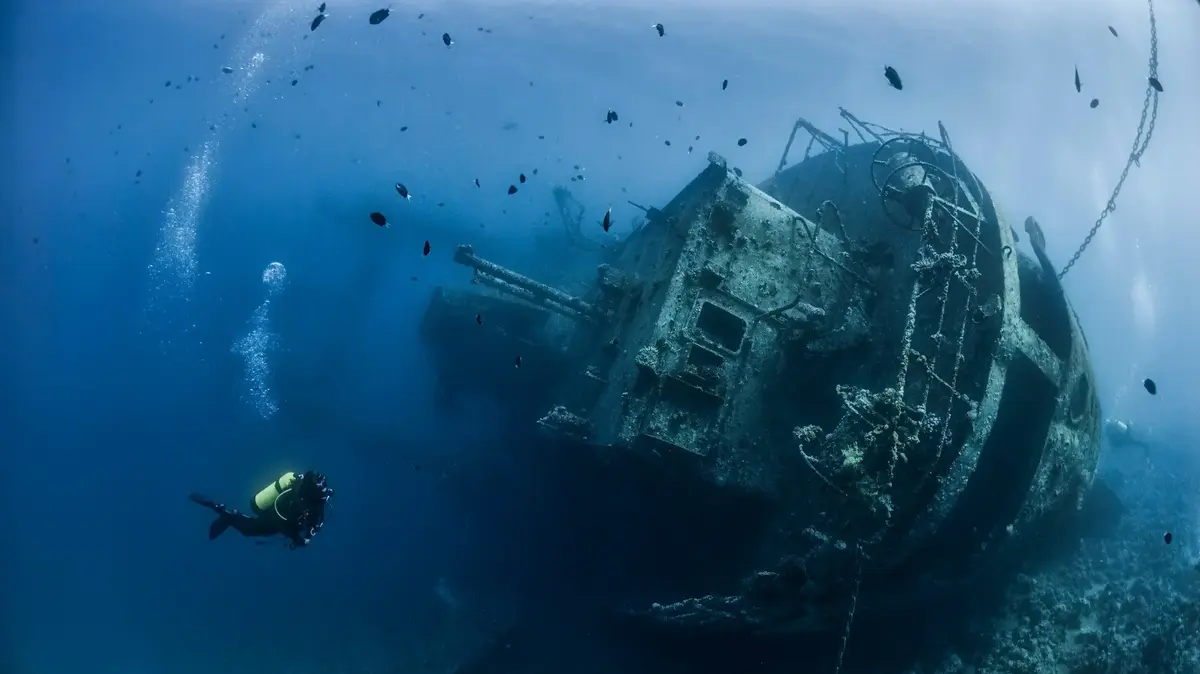Diving to the wrecks of the sailing ship "San Jose"/Armada de Colombia
The Colombian government launched a project earlier this year to salvage a 300-year-old shipwreck, which is estimated to hold $20 billion worth of treasure. Colombian President Gustavo Petro has ordered his government to remove what he has dubbed the "holy grail of shipwrecks" - the Spanish ship San Jose - from the bottom of the Caribbean Sea as soon as possible, the country's culture minister told Bloomberg.
Petro wants to raise the wreckage of the ship with 3 masts and 62 guns to the surface before the end of his term in 2026 - and asked to create a public-private partnership to realize the project. Mystery surrounds the ownership of the ship's vast cache of gold, silver and emeralds (barakat) valued between $4 billion and $20 billion, according to a lawsuit.
Now indigenous communities in Bolivia, the descendants of miners who dug for gold, are opposing the Colombian government's plans to salvage the remains of the 18th-century ship - and have called on Spain and UNESCO to step in and stop the project. Colombia hopes to begin recovering the artefacts from the wreck of the San Jose in the coming months, but the communities of Caranga, Chicha and Kilca in Bolivia claim that the ship and its contents belong to them.
Much of the treasure aboard the San Jose is believed to have been mined through forced labor by Bolivia's indigenous peoples, so Colombia's plans to extract the remains without consulting their descendants would violate international law, the communities said in a letter to UNESCO last week.
"Our lack of consent, our participation and without considering how it will affect the present and future of our communities is irresponsible and contrary to justice," they wrote, "We do not have the right to forget, nor does Spain or any of the American republics have the right to erase or change our memory ".
The San Jose, which was 46 meters long, was carrying a vast abundance of gold, silver and emeralds from Latin America back to Spain in 1708, when it was sunk by a British naval ship off the coast of Cartagena. Since its wreckage was located 600 meters underwater in 2015, the discovery has been "immersed" in international legal disputes, including an ongoing case in The Hague.
More on the topic
Researchers discovered in an ancient treasure metal items that came from outside the earth
The mystery of the ship that sank with its 32 crew members was solved after 120 years
Colombia, Spain and an American salvage company all claim ownership of the wreck - dubbed the "Holy Grail of Shipwrecks" - and its cargo. The Colombian government announced in February that it will soon begin researching the shipwreck and eventually hopes to build a museum dedicated to the vessel and the findings that were on it.
The government dedicated 7.3 million dollars to the first research phase which will require advanced technological robots to scan the seabed. However, Bolivia's indigenous communities claim that Colombia has no right at all to explore San Jose without including the descendants of those who rented the precious metals found in the ship's treasures. They believe much of San Jose's cargo was mined from the Potosi mines in southern Bolivia, making it a "shared historical and cultural heritage," they said.
The Potosi mines were the largest in the world and were the economic engine of the Spanish Empire. Historians believe that before the mountains were completely stripped of the precious metal they were the source of more than half of the world's silver. This vast wealth was dug and mined by the natives and slaves brought from Africa, then the money was transported on llamas to the coast and from there to Europe in Spanish treasure fleets like the San Jose to finance the colonial wars.
"We think that extracting important fragments from that period from the bottom of the ocean is like discovering an island, and on this island live our memories and the objects created by the work of our ancestors," said the representatives of the three indigenous groups in Bolivia.
More on the subject:
The mystery of the ship that sank with its 32 crew members was solved after 120 years
A ship that mysteriously disappeared 130 years ago was found by chance
The director of the Colombian Institute of Anthropology and History, Alejana Quesedo, recently told The Guardian that, in accordance with UNESCO's requests, the country will not sell precious artefacts recovered from the ship. The exclusion of indigenous communities in the debate over the fate of San Jose is "inexplicable", said Jose Maria Lencho, a lawyer in Madrid representing the three Bolivian groups. "We have enough rights, enough historical experience and I want to believe enough morals to be able to accept and contain the claims of those communities... Intervening on the site without the consent of these people would be a form of robbery ", he said, adding that Spain and Colombia missed a "historic opportunity" for reconciliation.
If the Colombian government removes any elements from San Jose and uses them for profit, even if they are placed in a museum, the indigenous communities must be paid "fair compensation for the use of our cultural heritage", the representatives of the communities argued The Colombian Ministry of Culture did not respond to the
letter
but said it had invited another indigenous community, the Qhara, to participate in the plans to explore the remains of the ship. The money, the Qhara Qhara claim the archaeological treasures through their rights to the land.

